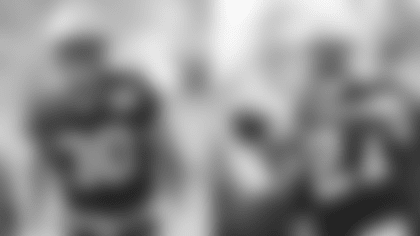What was your best sport growing up? For some people it might not have been football.
"Baseball had to be my best sport growing up. Back in the day, everybody started out playing baseball. That was my sport, and I thought I was going to get to college playing baseball. I played the outfield after playing first base early on in my career. I moved to the outfield and really enjoyed it. I played all the positions. On the basepaths, I don't know if I was speedy, but I studied the pitchers really well. The left-handed pitchers used to get me leaning the wrong way on occasions, but I could get a jump if I studied them."
So much of success is studying your opponent, isn't it?
"Guile is a big thing in any sport. It's important to study the details of all things, particularly opponents. Any detail you forget usually will jump up and bite you at the wrong time. Missing details will get you. In our sport (football), you do have to read the body language of the defender. You really have to be a student of that. In baseball, it's the same deal in reading pitchers. I think you have to study the human side of things more than just numbers and percentages. You have to know what defender you are playing against. You have to watch his tendencies from game-to-game-to-game. If he's in the same division, you have look to see how he played you the first time. It can tell you a lot for the second match-up."
When did you start playing football?
"I started playing Pop Warner in my home area of Long Beach (California). My brother got me into it because he was gung-ho about playing. We did not have Pop Warner in the county where we lived, so we had to go to Wilmington to play our Pop Warner. It was a good ride. I started off being one of the tight ends on the offense because you couldn't throw the ball from the quarterback position out wide, so we lined up closer to him. We could trade sides to the left or right. They'd call a play and we'd run our down-and-out and we'd catch it and run. I later played receiver and running back in Pop Warner and when I got to high school, I was a defensive back and receiver. When I went to college, I was a defensive back. Everybody always asked me how I made that switch when I got into coaching. I was a running backs coach at TCU under Jim Wacker. He wanted to go to a three-wide set and asked me if I wanted to coach wide receivers or running back. I took the receivers because the backs weren't going to get much action. I wanted to be in the action, so I took the three wide receivers. I knew what to look for in a receiver because I knew what hurt me as a defensive back. It worked out pretty well."
As a player, did you prefer offense or defense?
"I really preferred defense. I wanted to be the one doing the hitting, not the one getting hit. I'd rather dish it out rather than take it."
Who was the first true football influence you ever had?
"I would have to say all my coaches at Long Beach-Poly High School. They taught me discipline. I knew I could be a goof-off in class and if I were a goof-off and it got back to my coaches, I wouldn't be playing on Fridays. If it got back to my father, I was going to get my butt kicked at home. They taught me discipline. I still talk to those coaches today about how they helped me and motivated me to get to where I am today. My career path has been unbelievable, and they helped mold me. I think a lot of young men need that guidance. I did. It was Long Beach-Poly High School, home of scholars and champions. Everyone that sees that program and knows Long Beach knows exactly what high school I'm talking about."
You are proud of the school. There were other prominent products of the school, too, weren't there?
"Yes, there were. Billie Jean Moffitt King, the world famous tennis champion. We had Tony Gwynn a Hall-of-Fame baseball player, along with Chase Utley, Randy Moffitt, even a MLB umpire named Charlie Williams. In football, we had Tony Hill, Willie McGinest, Gene Washington, DeSean Jackson, Marcedes Lewis and even a current player with the Colts, Winston Justice. At one point, Long Beach-Poly may have had the most players of any high school in the NFL. If you want to talk entertainers, John Wayne went there a short time a long time ago. Snoop Dogg and Cameron Diaz went there, as did Carl Weathers. The school has been used as a backdrop for many commercials, TV shows and films. Those are names that many generations of people would recognize. I never met Billie Jean King. She was as prominent as any of the people I mentioned. She came back to the school and gave back to it, but it was before I was there. We have had a lot of prominent, talented people go through there."
Was there ever a person who tried to talk you out of playing football?
"I'm sure my mom, Gregory ("Yes, how about that? A man's name in a woman's body."), was scared when we first put on the pads and as we went up the competition ladder, but she never really quite talked us out of it. I'm glad because it did provide me structure outside of the home, and it did give me the direction to have a great career."
Talk about yourself as a player. How would you characterize yourself?
"As a player, I was coachable. I knew my responsibility and those of the guys around me. Sometimes I talked a little bit too much and got out of whack trying to make a play. I was just an average player. I can't say I was above average, but I was a team player who wanted to win. I played with heart and desire. I was aggressive. Depending on the game, I may have been overly aggressive where the coaches may have had to cool my jets a little bit and say, 'That's not how we're going to play. Don't get flagged.' The teaching really hit me at the right age. I needed it. Without football, I might not have been as disciplined as I needed to be and as I am today. That discipline served me well in later years as I grew up. Football teaches you values, teaches you team, teaches you character. There is character training through sports. That's my motto now, 'Character Training Through Sports.' That's what football did for me. I try to instill that in the men I coach."
Why did you choose the college you chose?
"Even though I was from California and had Pac-Ten offers, I chose Colorado State because of a good visit I had there when I came out of junior college. Coming out as a transfer, I knew I could play right away at Colorado State. I looked at the roster. I looked at film while I visited, I was big on looking at film. Academically, I knew they basically had what I wanted. I wanted to be an elementary school teacher so I could give back to my home community. Colorado State gave me that opportunity. It was a long way away from home. I got back home like normal students do at holidays or during the summer. I needed to get away to see if I could live away from home. You hear stories about some guys who go away and don't make it. It was a good experience for me. Once I decided to go, there was no turning back. That's what my dad, Charles, said also, 'If you're going to go that far away from home, just come back with a degree.' That stuck in my mind from the day I got there until I left with my degree."
What was your best collegiate experience?
"My best experience was a game we lost, and it came at Arkansas. I had a lot of tackles and I was in on a lot of plays and had a good day. What made that game memorable was because I got to see what big-time football was all about. SEC football is big-time football. In that league, you are about an inch away from playing in the NFL. Playing against those guys, and Lou Holtz was the coach, was a great experience. It was in my junior year, 1979."
When did you first think about a career in football after your playing days?
"I realized along the way that I had limitations, and speed was my limitation. I knew that college was going to be it for me, so I looked for the direction I would go. I thought I would go back and be a teacher. My curriculum at Colorado State really was more toward physical education, and I intended to pick up the necessary work to be an elementary educator. At Colorado State, though, I worked the Mile High Football Camp held by Sam Pagano, the outstanding football coach at Fairview High School in Boulder. He asked me if he could get me a full-time substitute teaching position that he needed an assistant coach, too, and he wanted to know if I were interested. I was a graduate assistant at that time doing administrative work, and I wanted to see if I could coach. I took it, and that was my first move into coaching. My father passed away, so I went back to high school coaching in California. From there I went to junior college coaching for a couple of years, then on to New Mexico State."
You were honest with yourself in assessing your limitations. Did that help you because sometimes people aren't honest with themselves?
"It did help that I took a hard look at myself. I realized I had played for a long time and had limitations. When I was playing at Colorado State, I was playing against good talent but not great talent. I had good, bad and average games, so I knew my limitations. I knew when I played my last game against the University of Hawaii that it was the end of the line, except for a spring game later on. I am glad I took that look and decided to get on with my life after football."
Did it mean something to you when you knew you were putting a uniform on for the last time, and do you think players today think about that?
"Putting on the uniform that last time meant something. It meant a lot of years of playing were over. I thought of all the years, the games, the coaches and teammates and how much fun it was. I thought how much time and energy it took to play and how it formed my life. I didn't think about the things I missed out on. People sometimes say, 'Well, you missed out on this or that.' Now that I am coaching, there are things I miss in my children's lives because of the job. My response is, 'The time I'm with my kids is what I cherish the most, and this job has allowed for me to provide for them. It has allowed for them to see places they normally would not see, or go to things they normally would not go to.' There is a saying I put on the board at the start of each season, 'Our character is what we do when we think no one is looking.' It's easy to do all the right things in front of your coach or head coach or coordinator. When no one is looking, are you running with the veterans, or are you in the meeting room trying to get better on your own?' Those are the things I did not see growing up. This is a business that does not last long. It is not going to be a long journey, it's the NFL. Hit this business running and get as much out of it as you can while you can. There will be a time when you hang up your cleats and put on that jersey for the last time. I also say, 'No regrets.' You can't go back."














